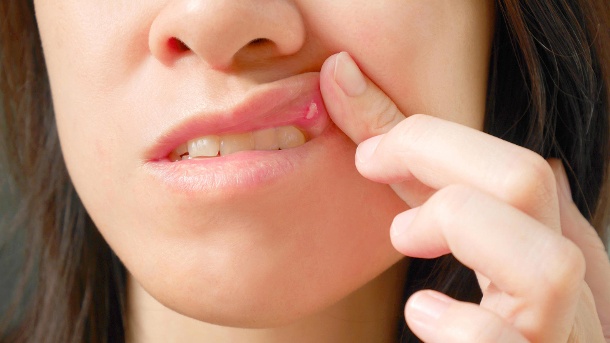
Almost everyone knows these little annoying things in the mouth that disturb and burn. The whitish ulcers are called aphthae. They develop on the mucous membrane or the tongue. Here’s what you should know about and what you can do to help with such inflammation.
They are whitish and only a few millimeters in size, but they can be quite uncomfortable to painful – aphthous. The unfamiliar term comes from the Greek: Aphthe means “ignite” and stands for a small ulcer of the oral mucosa. The skin on the mucous membrane or the tongue on which the ulcers are formed, however, are crimson.
It is the most common non-infectious inflammatory oral mucosal disorder. The approximately lentil-sized inflammations come either individually or in groups – up to six aphthous ulcers can form simultaneously.
You should avoid this with aphthae
Acid foods such as citrus or pineapple can increase the inflammation of the oral mucosa. The acid irritates the sensitive skin too much. Hot and hot food or drinks can also increase the symptoms.
Hard foods such as crispbread, crunchy cereals or nuts can also mechanically irritate the inflamed areas, which can also inhibit ulcers in their healing. Cool and soft foods such as yoghurt relieve the pain and facilitate healing. Alcohol has an irritating effect on mucous membranes and should be treated with caution. He can even be a trigger for aphthae.
Aphthae cause a disturbance. Those affected are tempted to play around with the tongue on the small ulcers or chew it lightly with their teeth. This should be better avoided, because the open areas can be more inflamed and hurt more then.
Medicines and home remedies for aphthae?
Usually the inflammations heal completely by themselves after one to three weeks. They can occur between three and six times a year.
The inflammation can treat you symptomatically with an analgesic. Such preparations with the active ingredient lidocaine or lidocaine hydrochloride anesthetize the painful areas. There are means available over the counter in the pharmacy as gels, sprays or mouthwashes. Experts also recommend prescription oral sprays or wound healing gels. Contact your doctor.
Mouthwashes with strong chamomile and sage effects can help to relieve pain and improve wound healing.
What are the causes of aphthae?
Aphthous ulcers can be caused by food or brushing teeth, not only because of minor mouth injuries, but also by accidentally biting the inside of the cheeks. But even badly fitting braces and prostheses can cause small injuries in the oral mucosa, from which aphthae then grow.
Why they occur again and again in some children and adults and sometimes occur frequently in families, is not yet scientifically clarified. It has been observed that women are more likely to suffer from the inflammation. For example, it is thought to be a misdirected immune response to common microorganisms in the mouth. Stress and the associated psychological stress could also be a trigger. Thus, a weakened immune system may favor aphthae – as well as inflammation in general.
When to go to the doctor with aphtha
Whenever aphthae develop more often, it is not a bad idea to seek medical attention for safety. Although the ulcers usually have no pathological cause, certain underlying diseases can be the cause in individual cases. Behind this, for example, the following diseases can be put: A herpes infection, hand-mouth-foot disease or even a severe colon inflammation. However, the aphthae may also be an indication of folic acid, iron, zinc or vitamin B12 deficiency.

